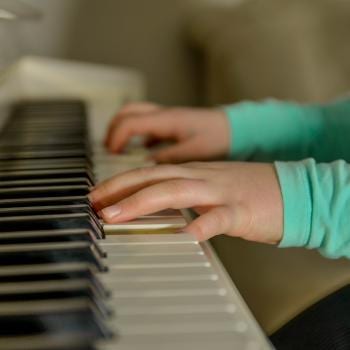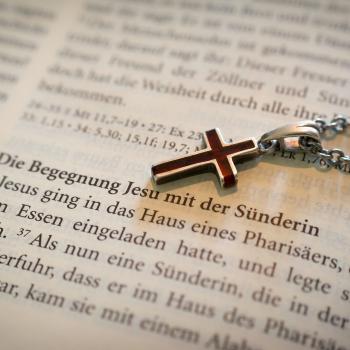“My legs are tired mommy, my legs are tired!” Sally was insistent.
“We’re almost home, honey, you can make it,” I assured her. Bobby was in the stroller, and as he is just moving from babyhood to toddlerhood I wasn’t going to make him walk.
“No I can’t! My legs are going to fall asleep!” Sally was again insistent.
“Come on honey, I know you can do it,” I said. “Just a little farther!”
And at that moment, Bobby climbed out of the stroller, looked at his sister, and pointed back at the stroller. Sally hopped in the stroller with a sigh of relief. For his part, Bobby turned to walk beside me. None of the conversation that took place between Sally and I had been directed at Bobby, who at only one year old has a mere handful of words at his disposal. Sally hadn’t even made a move on the stroller, trying to take the seat for herself. And yet, Bobby had understood that Sally was tired and wanted the stroller, and had decided to let her have the stroller and walk in her place.
With my background, I find this fascinating. My parents followed the child training methods of Michael and Debi Pearl. As such, my mother used to call babies “little bundles of sin.” The Pearls teach that children are born selfish, and that they must have this selfishness driven out of them through training sessions and the application of the rod. In raising my own children, I have rejected these methods completely and have walked out onto what is for me untrodden ground. I do not spank my children, with a rod or otherwise. Indeed, I rarely punish my children at all. Instead, I look for positive ways to carefully foster empathy and lovingly guide my children toward socially acceptable behavior. According to the Pearls’ teachings, children raised as I am raising mine—without the application of the rod—should be selfish, willful, manipulative, and uncaring for others’ needs. And yet.
Later the same day as the walk discussed above, Sean and I took the kids out for pizza. I held Bobby on my lap, as he likes. I finished my first slice and was engaged in conversation. I looked down just in time to see Bobby putting a new slice of pizza on my plate, having taken it from the tray just within his reach. Bobby had noticed that I had finished my slice, had thought correctly that I would like a second, had worked out how to get me a second, and had carried forth his plan.
Now, Bobby is no pushover. I’ve seen him clobber his sister for trying to take the iPad during his turn. This sort of expression of self—a sense of justice and an unwillingness to allow himself to be walked on—is positive and should be fostered (although it should of course be channeled toward more appropriate measures of redress than clobbering). But even as he is fiercely defensive of what is his, Bobby is also fiercely defensive of the people he loves, and extremely considerate. He looks, he sees others’ needs, and he acts. At the tender age of one, he has already begun to balance his own needs with the needs of others.
This isn’t to say that everything is always smooth sailing. There are plenty of times when the children fight over a toy, or when I cannot understand what Bobby is asking for, or when Bobby is a picky eater when I throw up my hands. Raising children is hard work. But I have watched empathy and consideration for others develop naturally in both of my children. Yes, these things need to be modeled, and yes, they need to be actively cultivated and fostered, but the seeds are already there, and watching them grow is a beautiful thing.
Selfish, willful, manipulative, and uncaring for the needs of others? No.
Little bundle of sin? I think not.














